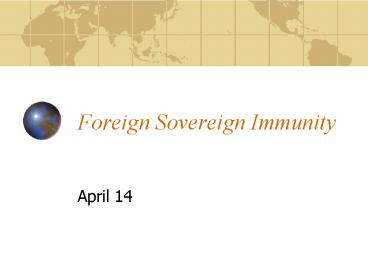Foreign Sovereign Immunity - PowerPoint PPT Presentation
1 / 18
Title:
Foreign Sovereign Immunity
Description:
Spain claimed sovereign immunity. The Court rejected that claim. Why? ... What are the underlying facts? What is the main holding of the court? ... – PowerPoint PPT presentation
Number of Views:34
Avg rating:3.0/5.0
Title: Foreign Sovereign Immunity
1
Foreign Sovereign Immunity
- April 14
2
Schooner Exchange v. McFaddon
- Who are the libellants in this case? What is
their claim? - How did the court resolve that claim?
- Is this a ruling on the merits? Or on
jurisdictional grounds? - Be prepared to summarize the courts rationale.
- Why does it matter that the vessel is a public
armed ship?
3
Schooner Exchange (cont.)
- How important was the political context? Was
this a political decision? - See note 1, pg. 833.
- Be prepared to discuss the questions in notes 2
and 3, pg. 833-34.
4
Victory Transport v. Comisaria General
- Spain claimed sovereign immunity. The Court
rejected that claim. - Why? How is this different from Schooner
Exchange? - What is the relevance of the treaties cited by
the court? - Note that the State Department did not take a
position in this case. - If it had, should the court necessarily accept
the State Depts position?
5
Victory Transport
- What explains/justifies the shift from absolute
immunity to the restrictive theory? - Why not abandon sovereign immunity altogether?
- Be prepared to discuss the questions in notes 2
and 3 on page 838.
6
Foreign Sovereign Immunities Act
- Why did Congress enact this statute? Were they
unhappy with the developing case law? - Consider note 4, pg. 850.
- Study the statute carefully (CB, pg. 839-42). In
class, you will be asked to apply the statute to
a couple of hypothetical cases. - A more complete version of the statute is in the
Supplement, at 596-605.
7
Foreign Sovereign Immunities Act
- Note the reference to a specific case in section
1605(a)(7)(A) - Why did Congress add this language?
- Is this constitutional?
- Which states have been designated as a state
sponsor of terrorism?
8
Texas Trading v. Nigeria
- The court holds that Nigeria is not entitled to
sovereign immunity. - Why not? How important is
- Statutory language?
- Legislative history?
- Prior case law?
- Rules of international law?
9
Texas Trading v. Nigeria
- Should the court have applied the FSIA
retroactively? (See note 1, pg. 848.) - See note 3, pg. 849-50.
- Does the case law make sense?
- Is this case less important to Nigeria than
Schooner Exchange was to France? If not, how do
you explain the different outcomes?
10
Argentina v. Amerada Hess
- The Court held that the FSIA provides the sole
basis for jurisdiction over a foreign state in
U.S. courts. - Why?
- Is the courts rationale persuasive?
11
Argentina v. Amerada Hess
- The Court also held that none of the FSIA
exceptions applied in this case. - Do you agree?
- Consider notes 4 and 5, pg. 857.
- Be prepared to discuss the questions raised in
notes 1, 6, and 10 on pages 856-59.
12
Act of State Doctrine
- April 15
13
Underhill v. Hernandez
- What are the underlying facts?
- What is the main holding of the court?
- Why does the court arrive at that result?
- If the US had a bilateral treaty with Venezuela
in which each country promised protection for
citizens of the other, would the result be
different? - Be prepared to discuss note 1, pg. 868.
14
Banco Nacional v. Sabbatino
- What are the underlying facts?
- Note the Courts justification for the act of
state doctrine - Its not international law
- Its not constitutional law
- What is it?
- Is the Courts rationale persuasive?
15
Banco Nacional v. Sabbatino
- The Court suggests that there would be severe
negative consequences if a U.S. court declared
the Cuban governments act of expropriation
illegal. - What is the Court worried about?
- Is that concern justified?
- What guidance does the Court give to help lower
courts apply the act of state doctrine in future
cases? - Is the Courts guidance likely to produce a
consistent body of case law in the future?
16
Banco Nacional v. Sabbatino
- See note 3, pg. 869. If you were a Member of
Congress in 1964, would you have voted for the
Second Hickenlooper Amendment? - Why or why not?
- Be prepared to discuss the questions raised in
note 4, pg. 870.
17
Kirkpatrick v. Environmental Tectonics
- The Court holds that the factual predicate for
application of the act of state doctrine does not
exist. - What is the basis for that holding?
- Is the Courts rationale persuasive?
- Assume, for the moment, that the factual
predicate does exist. - Are there good reasons NOT to apply the act of
state doctrine in this case? What are those
reasons?
18
Act of State Doctrine
- Should the act of state doctrine be abolished?
- If so, what doctrine(s) could be used to
accomplish the legitimate purposes the doctrine
was designed to promote? - Should the doctrine be retained, but
reformulated? If so, how? - Consider note 2, page 875-76.































